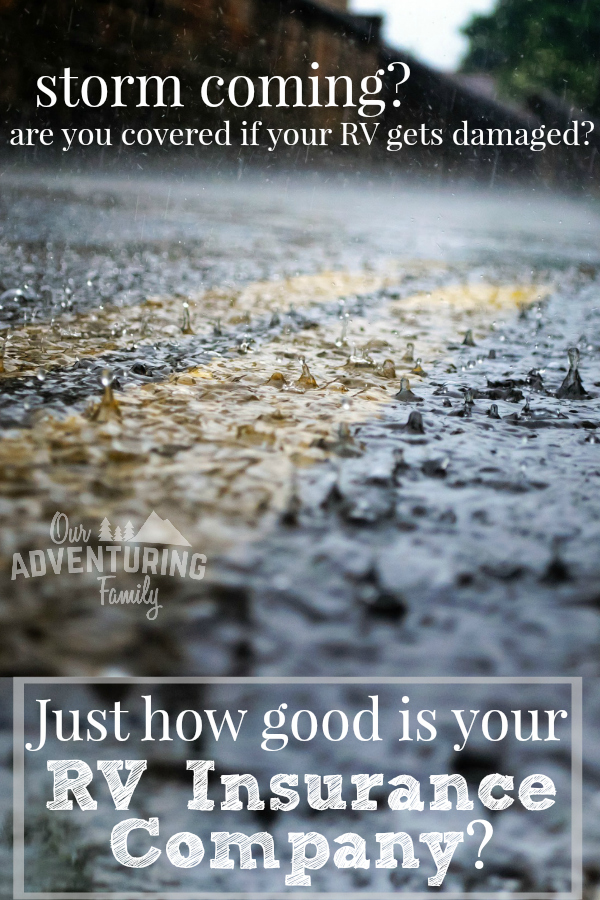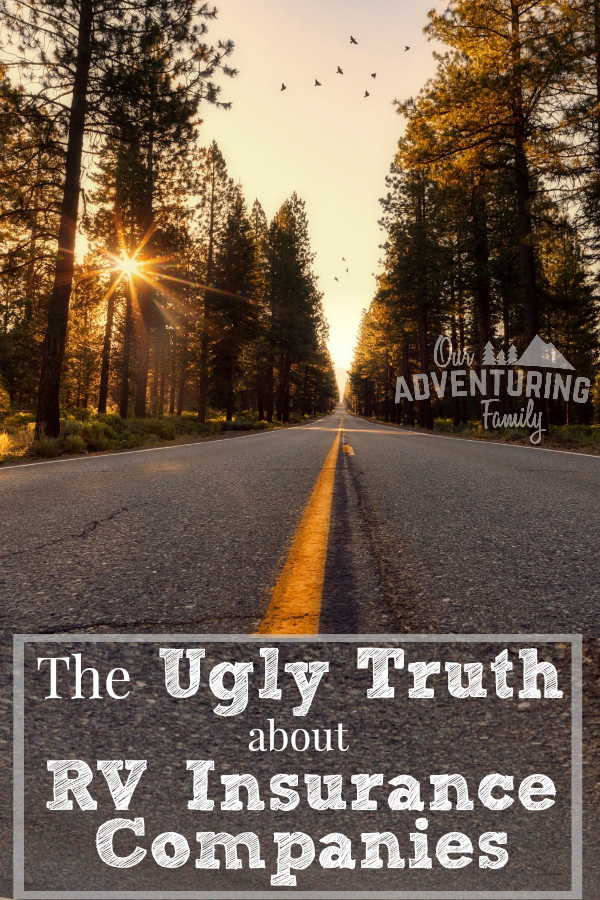This post may contain affiliate links. As an Amazon Associate I earn from qualifying purchases, but there is no additional cost for you. Please see my Disclosure page for more information.
This post is based on our experiences with two different RV insurance companies. Not all insurance companies are alike and your experiences may vary, so do your due diligence when purchasing an insurance policy.
Based on the two experiences that I’ll share in a minute, we have come to the realization that many insurance companies that insure RVs don’t truly understand how RVs are different from passenger vehicles. Some companies are trying to understand those differences, but some companies aren’t interested in understanding the difference and are only interested in not making a payout.
Both of our experiences deal with water damage to the roof, caused by falling branches poking a hole and allowing water in. I don’t know about you, but we’re not up on the roof of our RV or trailer every other day checking for damage, so in both instances, we didn’t know there was a hole until we saw water damage inside.
Our First Insurance Claim
Our first experience was with our travel trailer. We have no idea what storm knocked a branch into the roof of our trailer, but at some point it happened. Once we noticed some water damage inside, we called our insurance company to make a claim. An adjuster came out (in a pouring rainstorm), but he wasn’t confident that the insurance company would pay to fix the roof. He was confident that the initial damage would be covered, but not the subsequent water damage.
We argued that we didn’t use the trailer on a daily basis, so how would we know that there was a hole in the roof until the water damage appeared? The adjuster must have gone to bat for us, as they did eventually pay $5k to replace the roof.
That insurance company is Progressive, thru USAA. We’d recommend them to others.
Our Second Insurance Claim
Our second experience was with a different insurance company because we’d decided to rent out our RV to others and our preferred insurance company (Progressive) doesn’t allow that.
As with our trailer, we have no idea when the roof was damaged. We noticed some water damage on the interior wall of our RV and we called the insurance company to make a claim. Rather than coming to check the RV in person, we were told to send pictures. They then replied that they would pay to patch the hole in the roof, but that was it. We used the same argument that we’d used with the trailer, but they weren’t budging.
The Problem
Depending on the time of year, it can be a month or more in between visits to the RV. It’s impossible to know the exact moment a hole is poked in the rubber surface of the roof. Now, if it went through all the layers of the roof, I could understand us not having an excuse. But since the hole was only in the outer rubber layer (in both instances), the damage was much slower to make itself known.
Since our insurance company wouldn’t pay to fix the RV, we knew we’d need to save up some money to pay for the repairs out of pocket. A few months later we took the RV to an RV body shop to get an estimate. At their encouragement, we contacted the insurance company again to see if they’d cover the damage.
Despite repeatedly emphasizing that we’re not in the RV on a daily basis and had no way of knowing that there was a hole in the roof, they still refused to pay our claim. They maintained that if you got a hole in the windshield of your car, they’d fix it, but if you waited a few days before calling them and it rained and your car got flooded, they would fix the windshield but not the water damage.
Seriously, that was the analogy multiple “customer service” representatives used.
This insurance company clearly doesn’t understand that a car windshield is very different from an RV roof. And that the usage patterns of both are also very, very different. A windshield is highly visible (you look through it every time you get in the vehicle) and damage is immediately obvious. A roof is not highly visible (you have to climb up on it and inspect it for damage), and damage is not immediately obvious.
Or perhaps they know that it’s a silly argument, but the company policy is to pay out as little as possible, so they’re maintaining that as their line of reasoning to justify why they don’t need to pay out on claims.
Super frustrating. Why do we pay insurance premiums if the insurance company isn’t going to actually help us?
This insurance company is National General, and we cannot recommend them to others. We have canceled our policy with them and gone back to Progressive.

On a side note, we are in the process of constructing a metal roofed carport large enough to protect our RV and two cars from future damage. We’re doing the site work this coming week, but the actual carport will have to wait a bit longer. We now have to decide if we’re building a carport first or paying for expensive RV repairs first. We thought we could do the repairs ourselves, but replacing the wall boards around both slides proved more than we are capable of doing (I’ll share more about that experience soon).
So how do you know if your insurance company will actually pay your damage claims or tell you you’re out of luck? Do a bit of research before buying that insurance policy.
3 tips for finding a good RV insurance company
1. Get a recommendation from a friend who RVs
Find out what type of claims they’ve made and how fast they were taken care of. Were any claims denied, and what was the reasoning? Talking to others who have been in a similar situation is such a good way to get the scoop on different companies.
2. Ask for recommendations in an RVers Facebook group
People online are more than willing to share their experiences. Don’t forget to ask followup questions about the experiences they share so you have enough information to make an informed decision.
3. Take lists of best RV insurance companies with a grain of salt
I looked up a couple of such lists and found National General on both of them. After our experience with them, I’m not very trustful of any site that recommends them. This is why it’s important to talk to people who have actually used the insurance company you’re interested in. Bonus points if you can get recommendations from people who use their RV or trailer in a similar manner as you (and are likely to have similar damage complaints).
~~~~~
Have you had any RV damage claims denied? Please share your experiences!


